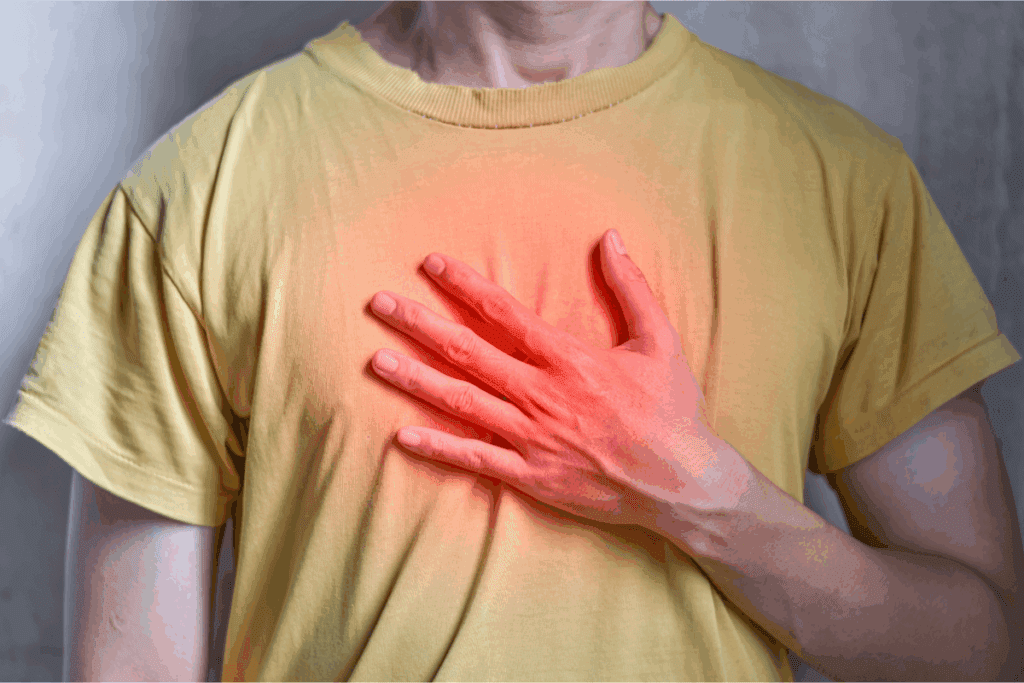Last Updated on November 25, 2025 by Ugurkan Demir

Did you know that intense stress can mimic or even trigger a real heart attack? At Liv Hospital, we focus on our patients and use the latest medical standards. We want to share important facts about the signs and symptoms of stress-induced heart issues.
Stress-induced cardiomyopathy, or “broken heart syndrome,” is a serious condition. It can have severe effects if not treated quickly. We will look at the symptoms that might show a heart attack caused by stress. We stress the need for fast medical help.

When we face intense stress, our heart can react in unexpected ways. This can lead to stress-induced cardiomyopathy, also known as “broken heart syndrome.” It shows how our emotions can affect our heart health.
“Broken heart syndrome,” or takotsubo cardiomyopathy, is a temporary heart issue. It looks like a heart attack but isn’t caused by blocked arteries. It happens when we face extreme emotional or physical stress, weakening the heart muscle.
Stress makes our body release hormones like adrenaline and cortisol. These hormones help us react to stress but can harm the heart. They can disrupt the heart’s normal function, leading to stress-induced cardiomyopathy.
Stress affects the heart in many ways. Long-term stress can cause inflammation and increase heart disease risk. Knowing this helps us manage and prevent heart problems linked to stress.
A traditional heart attack happens when a coronary artery gets blocked. This blocks blood flow to the heart, damaging or killing heart muscle. It’s usually due to plaque buildup in the arteries.
Stress-induced cardiomyopathy, on the other hand, isn’t caused by artery blockage. It’s thought to be triggered by stress hormones that temporarily impair heart function.
| Characteristics | Stress-Induced Cardiomyopathy | Traditional Heart Attack |
| Cause | Triggered by intense emotional or physical stress | Caused by blockage in coronary arteries |
| Coronary Artery Involvement | No blockage; stress hormones affect heart function | Blockage due to plaque buildup |
| Duration of Heart Damage | Temporary; heart function typically recovers | Can cause permanent damage if not promptly treated |

Stress-induced heart attacks are serious and complex. They happen when stress hormones affect the heart. When we’re stressed, our body’s “fight or flight” response kicks in. This releases hormones like adrenaline and cortisol, making our heart rate and blood pressure go up.
Stress hormones greatly impact the heart. Adrenaline, in particular, can suddenly increase heart rate and blood pressure. This extra strain can lead to a heart attack, more so in those with heart conditions. “The surge of stress hormones can be so intense that it mimics the symptoms of a heart attack,” says a leading cardiologist.
The heart’s reaction to stress isn’t just immediate. It can also have long-term effects. Chronic stress can cause sustained high blood pressure and increased heart rate. Both are risk factors for heart disease.
Takotsubo cardiomyopathy, or “broken heart syndrome,” happens when extreme stress weakens the heart muscle. It can cause symptoms like chest pain and shortness of breath. The heart’s reaction to stress can be so severe that it temporarily changes the heart’s shape, affecting its ability to pump blood.
“Takotsubo cardiomyopathy is a dramatic reminder of the powerful connection between the heart and the brain,” notes a medical expert. “It’s a condition that shows how important managing stress is for heart health.”
The heart damage from stress-induced conditions can vary. In some cases, like Takotsubo cardiomyopathy, the damage is temporary. The heart can recover with the right treatment. But in other cases, stress can cause a heart attack with permanent damage. The sooner medical treatment is sought, the better the chances of minimizing damage.
Understanding how stress leads to heart attacks is key for prevention and treatment. Recognizing the signs of stress-induced heart conditions and getting medical help quickly can reduce serious complications.
Stress can lead to a heart attack, and chest pain is usually the first sign. This pain is a big worry, and knowing what it feels like is key to acting fast.
Heart pain from stress, like Takotsubo cardiomyopathy, feels different. It’s in the middle of the chest and can feel like pressure or squeezing. It’s often very severe and sudden, which can be scary.
People with stress-induced heart attacks often feel:
The pain can spread to other areas, known as referred pain. It often goes to:
This happens because the nerves that supply the heart also cover these areas. It can be hard to figure out where the pain is coming from.
Seek help right away if you have chest pain that:
Quick medical care is vital for heart attacks. If you’re not sure if you need help, it’s better to be safe and get medical attention.
Shortness of breath is a key sign of a heart attack. It often shows up with or without chest pain. This symptom means the heart might not be working right because of stress.
Stress makes our body’s “fight or flight” response kick in. This releases hormones like adrenaline. These hormones can really affect our heart and lungs, causing breathing problems.
Stress changes how we breathe. It makes our breathing shallower and faster. This can mean we take in less oxygen, making it harder to breathe.
Stress also tightens the muscles we use to breathe. This makes it even harder to breathe deeply.
The link between breathing issues and heart function is complex. When the heart is stressed, it doesn’t pump blood well. This means less oxygen gets to our body’s tissues.
This can cause us to feel short of breath as our body tries to get more oxygen. Also, if the heart can’t pump well, fluid can build up in the lungs. This makes breathing even harder.
It’s important to know when breathing problems are serious. Look for signs like being very short of breath even when resting. Also, if speaking is hard because you can’t catch your breath, or if your lips or fingers turn blue.
If you see these signs in yourself or someone else, get help right away. Call for emergency medical care.
A heart attack caused by stress can lead to dizziness, lightheadedness, and fainting. These symptoms happen because the heart can’t pump enough blood. This is a problem for the brain.
Dizziness during a stress-induced heart event often comes from a sudden drop in blood pressure. Or it’s because the heart can’t pump well. Stress hormones like adrenaline can make the heart beat too fast. This can lead to a condition called Takotsubo cardiomyopathy or “broken heart syndrome.”
This condition makes the heart act like it’s having a heart attack. It can cause dizziness because the heart isn’t pumping enough. Stress can also make you breathe too much, which lowers carbon dioxide levels. This can make you dizzy too.
Before fainting, you might feel several warning signs. These include:
It’s important to recognize these signs. Fainting can cause injuries and might show a serious heart problem.
If you feel lightheaded or dizzy during a cardiac event, do the following:
| Action | Description |
| Stay Calm | Try to remain as calm as possible to reduce stress on the heart. |
| Seek Support | Have someone with you to provide assistance if needed. |
| Loosen Tight Clothing | Remove any constrictive clothing that may be restricting blood flow. |
| Call for Medical Help | If symptoms persist or worsen, immediately call emergency services. |
Managing lightheadedness during a cardiac event can prevent more problems. It also ensures you get medical help quickly.
Breaking out in a cold sweat can be a sign of extreme stress. It might even lead to a heart attack. Stress triggers our “fight or flight” response, releasing hormones like adrenaline. This can cause us to sweat a lot.
Our body’s stress response helps us react to threats. When we feel stressed, the hypothalamus in our brain starts the sympathetic nervous system. This leads to stress hormones being released.
These hormones get our body ready to fight or flee. They increase our heart rate, blood pressure, and breathing. So, we might start sweating a lot.
Stress can make us sweat, but it’s key to know the difference. Stress sweats come with symptoms like a fast heartbeat, trembling, or feeling anxious. On the other hand, heart-related sweating might come with chest pain, shortness of breath, or feeling dizzy.
If you’re not sure why you’re sweating, it’s best to see a doctor.
Excessive sweating with chest pain or trouble breathing is a medical emergency. If you or someone you know has these symptoms, call emergency services right away. Timely medical help is vital to avoid serious problems or even death.
In summary, sweating is normal in stress, but knowing the context and symptoms is important. If you’re sweating a lot and have heart attack signs, get help fast.
Heart palpitations and irregular heartbeat can be scary symptoms during a stress-induced heart attack. Stress triggers our “fight or flight” response, releasing hormones like adrenaline. This can make our heart beat faster or irregularly.
Palpitations during stress feel like a racing, pounding, or fluttering in the chest. Stress hormones can change how the heart works, making it beat faster or irregularly. “The heart’s response to stress is complex,” a cardiology expert says. “It involves a complex mix of hormonal and nervous system signals.”
While some palpitations are harmless, others might mean a heart problem. It’s important to know the context and other symptoms to understand how serious it is.
Not all heart rhythm changes are bad. For example, occasional premature beats are usually okay. But, if palpitations last a long time or are very severe, they might be a sign of a serious problem.
If you have any of these, get medical help right away:
Watching your heart rate during stressful times can give you important insights. Use a heart rate monitor or a smartwatch to track it. Keeping a log of your heart rate during stress can help spot patterns and problems.
“Monitoring your heart rate is a proactive step in managing your heart health,” a healthcare professional says. Knowing how your heart reacts to stress can help you take steps to avoid risks.
Feeling unusually tired, weak, and nauseous can be a sign of a heart attack. Stress triggers our body’s “fight or flight” response. This releases hormones like adrenaline and cortisol, affecting our heart health.
A stress-induced heart attack can lead to the heart not getting enough oxygen. This causes the heart to work less efficiently, making us feel extremely tired. We might feel weak or lack energy, even after resting or doing light activities.
The body’s stress response can also reduce blood flow to the heart. Stress hormones can disrupt normal body functions, making us feel exhausted.
Nausea and other stomach problems can happen during a heart attack caused by stress. Stress can affect the digestive system, causing nausea, vomiting, or stomach pain. These symptoms might be mistaken for other issues, like food poisoning.
Stress can also reduce blood flow to the digestive system, causing stomach problems. We should watch for these symptoms, along with other heart attack signs like chest pain or shortness of breath.
Fatigue is common in many health issues, but unusual tiredness can signal a heart attack. We should be careful if we feel persistent or severe tiredness that doesn’t go away with rest. If it’s paired with other heart attack symptoms, it’s a red flag.
It’s important to listen to our bodies and get medical help if we have unusual or ongoing fatigue, weakness, or nausea. This is true if we have heart disease or are at risk for heart problems. Spotting these symptoms early can prevent serious issues and improve our health.
It’s important to know the signs of a heart attack caused by stress. This knowledge helps us take steps to keep our hearts healthy. Most people get better from stress-induced heart problems with the right care.
Changing our lifestyle can help a lot. Eating well, moving more, quitting smoking, and managing stress are key. These actions can lower our risk of heart problems after a heart attack.
Being aware of stress heart attack risks is the first step. Taking action to reduce these risks is the next. This way, we can avoid more heart issues and feel better overall.
Stress-induced cardiomyopathy, also known as “broken heart syndrome,” is a condition. It happens when the heart muscle weakens due to intense emotional or physical stress. This leads to symptoms similar to a heart attack.
Stress itself doesn’t directly cause a heart attack. But it can trigger stress-induced cardiomyopathy or Takotsubo cardiomyopathy. These conditions mimic heart attack symptoms.
Symptoms include chest pain, shortness of breath, and dizziness. You might also sweat a lot, feel heart palpitations, get tired easily, feel weak, and nauseous. These symptoms need immediate medical attention.
Stress releases stress hormones like adrenaline. This can cause a sudden increase in heart rate and blood pressure. It can weaken the heart muscle or lead to Takotsubo cardiomyopathy.
Yes, broken heart syndrome is dangerous and needs immediate medical attention. It’s often reversible but can lead to serious complications if not treated quickly.
In most cases, stress-induced cardiomyopathy is temporary. The heart function usually returns to normal once the stress is alleviated. But in some cases, it can cause lasting heart damage.
Stress-induced heart pain often presents with chest pain and symptoms similar to a heart attack. A doctor can diagnose the cause through tests like ECG and echocardiogram.
Stress can cause shortness of breath because the heart can’t pump blood effectively. This is a sign that may indicate stress-induced cardiomyopathy or other heart issues.
If you have symptoms like chest pain, severe shortness of breath, dizziness, or fainting, seek immediate medical help. These could be signs of a serious heart condition.
Manage stress through lifestyle changes. Regular exercise, a balanced diet, enough sleep, and stress-reduction techniques like meditation can help prevent heart conditions.
Takotsubo cardiomyopathy is a condition where the heart muscle weakens, usually due to intense emotional or physical stress. It leads to a characteristic “ballooning” of the heart’s left ventricle.
Yes, stress can cause heart palpitations due to stress hormones affecting heart rhythm. While often harmless, they can be a symptom of an underlying condition.
Some heart rhythm changes during stress are normal. But dangerous changes like severe palpitations or arrhythmias need medical evaluation to rule out underlying heart conditions.
Subscribe to our e-newsletter to stay informed about the latest innovations in the world of health and exclusive offers!